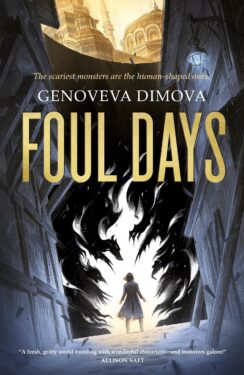We are excited to share a special letter from Genoveva Dimova, the talented author of Foul Days. In her debut novel, rooted in Slavic folklore and fast-paced fantasy, Genoveva introduces us to Kosara—a witch battling dark forces in the walled city of Chernograd. Join us as Genoveva takes us behind the scenes of her captivating world, sharing insights into her creative process and the rich storytelling that shapes Kosara’s perilous journey.
Read Genoveva Dimova’s letter below, and make sure to pre-order your copy of Foul Days, coming 6/25/2024.
by Genoveva Dimova
Dear Reader,
Foul Days is a story about human-like monsters and monstrous humans; about defeating the ghosts from your past and learning to trust your gut.
I come from a small country in South-Eastern Europe, known for its wine, yogurt, and roses, located at the crossroads between Europe and Asia. Over the centuries, it has been the home of many different peoples, each bringing their unique cultures, languages, and beliefs. In fact, the word “Bulgarian” comes from the Proto-Turkic bulģha, “to mix,” “to shake,” “to stir.” This mixture of traditions is at the core of Foul Days, which shakes and stirs together (like a well-blended Martini) all my favourite aspects of Bulgarian folklore: the creepy monsters, the obscure rituals, the unexpected meaning hidden in folk songs.
Growing up, most fantasy I read was set in that ubiquitous pseudo-Western-European, pseudo-Medieval setting we all know. I made my own attempts to write that sort of story—except it never rang true. Something was missing (like a Martini without the olive).
Until one day, as fantasy as a whole was moving more and more towards diverse and underrepresented cultures, it clicked. I didn’t need to write about dragons and vampires when I could write about zmeys and upirs. Instead of stories about knights and lords, I could have clever witches tricking cruel men.
I’ve always loved the monsters from Bulgarian folklore, each representing some deep-seated fear that existed in traditional society. Upirs, for example, are the restless spirits of the dead who haven’t been buried properly, rising from their graves to torment their relatives. Halas and lamias are vengeful creatures who, when scorned, cause floods, storms, and hurricanes. The zmey, the Slavic dragon who disguises himself as a handsome man in order to seduce young women, is often believed to be an allegory for depression, which in my eyes made him the perfect villain. Then, I stumbled upon the myth of the Foul Days—the twelve days between Christmas and St. John the Baptist’s Day, after the new year has been born but before it has been baptised, when monsters and ghosts roam the streets—and I knew I’d found the perfect setting for my story.
I hope you enjoy reading my very Bulgarian book as much as I enjoyed writing it!
Genoveva Dimova
Dive into an excerpt here and Pre-order Foul Days—available on June 25, 2024!













Leave a Reply